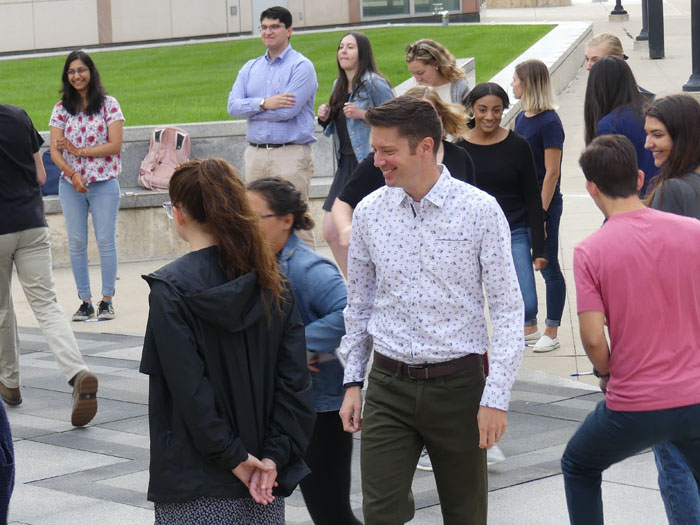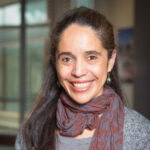
Looking to refresh curriculum for long-standing program, Chris Bohle wanted to instill a gameful mindset in Undergraduate Research Opportunity Program seminars
Sean Corp, Content Strategist
For more than 30 years, the Undergraduate Research Opportunity Program has been a conduit connecting researchers, undergraduate students, and community partners and organizations. In 2019, new associate director of curriculum and retention Chris Bohle was tasked with reinvigorating the program with a fresh take on its curriculum.
Bohle wanted to reimagine the seminar program to make students as excited about the required seminars on becoming a better researcher as they are about conducting the research itself.
As he and UROP staff evaluated the possibilities, he felt like there was promise in adopting a gameful learning approach — a way to ensure the curriculum was relevant, high in quality, and engaging and empowering to UROP students.

“We wanted the seminars to feel fresh,” Bohle said from his home office. “We wanted to use the seminars to make the students more curious because curious people are better researchers. Curiosity allows us to ask more and better questions.”
Adopting the philosophies of gameful learning, Bohle decided the more autonomy the students had, the more agency they would have in their education. And when the students began seeing the results of that agency and curiosity paying off, they would become more engaged with the material. That’s the gameful learning approach.
That led Bohle to GradeCraft, the Center for Academic Innovation software program that allows instructors to build courses using gameful pedagogy. GradeCraft offers students a platform to track points, unlock assignments, and evaluate their progress using learning analytics. GradeCraft’s pedagogical approach aligned with several goals Bohle had for his new take on the curriculum — putting students in charge of their learning, allowing students the freedom to fail, a system that made the required learning more engaging.
GradeCraft was co-founded and developed in 2011 by Barry Fishman, professor of learning technologies in the School of Information and Cait Hayward, now the associate director of research and development at the Center for Academic Innovation. It was originally conceived as part of the Transformational Learning for the Third Century Initiative. GradeCraft is one of the learning tools the center manages as part of its software portfolio.
To make sure he was on the right track, Bohle checked in with the best focus group he could think of — UROP’s Peer Facilitators. These are students who took part in UROP research projects as first- and second-year undergraduates and were now facilitating the seminar courses for the next cohort of students. Many also used GradeCraft in other classes at the University of Michigan.
“They often said their GradeCraft courses were the best courses they had ever taken,” Bohle said.
Bohle knew how he wanted to experiment with the curriculum. Still, he needed to figure out how to adapt and create material that would impact roughly 90% of the 1,200 UROP students with research projects representing all 19 U-M colleges.
After his first meeting with James Alexander, the center’s senior software ambassador, Bohle was confident that the Center for Academic Innovation was the perfect partner in trying this kind of endeavor. Katherine Dumoulin, UROP Peer Facilitator, was also integral in helping the project move forward. With her deep experience in the UROP program and prior experience taking courses within GradeCraft, she was able to help develop curriculum content and format material within GradeCraft.
Alexander’s role requires him to wear many hats — salesperson, consultant, platform expert, and troubleshooter. He is as invested in the pedagogical foundations of GradeCraft as he is the functionality and feature set.

“Chris and the UROP leadership team came in with a direction in mind, but they didn’t know how to get there,” Alexander said. “There was a lot of talk about design and implementation. A lot of back and forth and trying things out and refining the approach.”
Alexander often works with faculty to understand their learning goals and helps faculty determine how the platform can facilitate those goals. Gameful learning is about choice and providing various pathways toward accumulating points. That often means taking a step back and making sure there aren’t too many options on the table, Alexander said.
“When faculty are interested in gameful learning, they can sometimes go overboard with choice, and that can lead to choice paralysis for the students and burnout for the faculty. My job is to step back and ask, ‘What do we want students to learn? How can we give students options and multiple paths to learning?’ ”
Bohle and the UROP leadership team appreciated Alexander’s hands-on approach and investment in student success that matched their own.
“James has become one of my favorite people at the university. He had this wealth of knowledge about how the platform worked, but he also had great ideas and examples of how other people have accomplished similar goals and a dedication to student-learning and student-centeredness.”
“He sat down with me in January of 2020 when we were planning to start a small GradeCraft pilot with one or two sections. He answered countless emails. He held meetings with the director of UROP, Dr. Michelle Ferrez, and myself, and walked us through everything. He would review our content and ask questions we hadn’t even thought of.”
About that “small” pilot …
Originally pitched as a modest implementation of GradeCraft into one or two of 40 seminars, the COVID-19 outbreak made everyone reassess the path forward. UROP leaders quickly determined they should build nearly all the program’s seminars within GradeCraft including the Research Scholars Program for second-year UROP students led by Dr. Luciana Nemtanu, associate director of research mentors and training, and the Entering Research section of UROP led by Charmise L. Knox, academic program manager.

“We knew that because of COVID, there was a chance that students would be faced with an extended leave of absence,” Bohle said. “It was reassuring to be able to say to a student, ‘It’s OK that you’re going to miss seminars … Once you’re ready to come back, you can find an alternate path to earn the grade you want.’ ”
That flexibility was always one of the biggest selling points of using GradeCraft, and that became doubly important during the distance imposed in the past year.
“GradeCraft has the ability to make high-stress situations for students feel less stressful. And that’s huge,” Bohle said.
The transformation included vetting all previous seminar assignments and integrating UROP’s core competencies into its GradeCraft implementation.
Bohle and his team decided on the following competencies: attendance; project-related work; diversity, equity and inclusion (DEI); personal and professional development; research acumen; interdisciplinary work; and intellectual curiosity.
The team then evaluated existing assignments against those competencies and determined which needed to stay as is, which needed to be revised or rewritten, and which needed to be scrapped.
Some key features within GradeCraft were of particular interest to Bohle. He wanted to use the grade predictor to help students track their progress. He wanted to utilize GradeCraft’s unlocking feature to let students earn points to gain access to future assignments.
He also wanted to provide students several pathways to accumulate points, allowing them to select the most interesting and challenging assignments. Bohle hoped it would instill a “freedom-to-fail mindset” that provided students additional options to boost their grade if they struggled with or missed a previous assignment.
Bohle relied on his peer facilitator group, giving them free rein to create assignments and progress badges within GradeCraft. As recent UROP graduates, the peer facilitators knew the kinds of assignments to which current students would best respond.
One option includes delving into “academic Tik Tok.” Students create a Tik Tok video that illustrates core ideas behind their research, challenging them to explain it briefly and in plain language. Another option asks students to explore the #blackintheivory hashtag detailing what it’s like to be a black student in higher education and reflect on what they found.
“Students are actively choosing assignments that are deep, and I have been thrilled to see their willingness to challenge themselves and the level of their reflection,” Bohle said.
While the planned “small pilot” expanded to nearly 1,200 students in 40 sections once the scope of the COVID-19 outbreak was known, both Bohle and Alexander said they are thrilled with the early results and excited to see how this change in curriculum complements the students’ research.
The next steps will be to evaluate how GradeCraft has fared during this pilot stage. While the early results show promise, the UROP team plans to analyze data from a mid-year evaluation and collect additional data at the end of the year. Then they will talk again to the peer facilitators to get their impressions on what is working and what is not with the GradeCraft implementation.

The perspective of peer facilitators is vital because they first experienced the course before GradeCraft and will know best what has been gained and lost with the new seminar format. They will also best know how to improve it for students and future peer facilitators going forward, Ferrez said.
“In the end, it is not about a tool (like GradeCraft). It truly is about how best can students learn in the most meaningful way and in a way that works for them,” she said.
Alexander said he is happy to see even more students learning using gameful learning and is excited to see what data comes from this expanded pilot.
“This is probably the biggest launch within GradeCraft on the Ann Arbor campus,” Alexander said. “I’m excited to have so many students exposed to gameful pedagogy. Having a gameful mindset and feeling like you have control over how you go through the course makes them better graduates because they experience things in their program that they will experience in their professional life. There are a lot of things you could be doing, and you have to decide the best path forward.”


